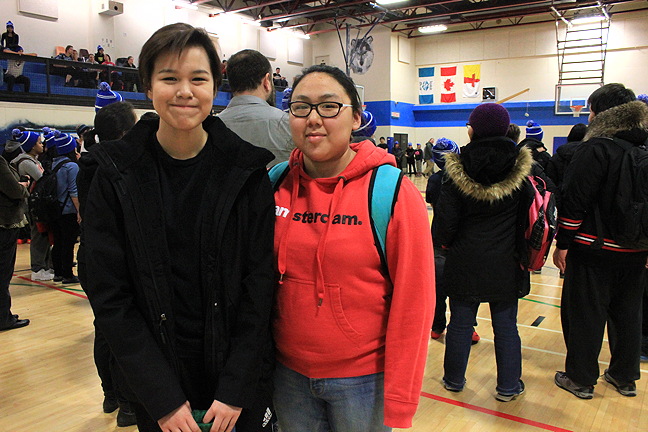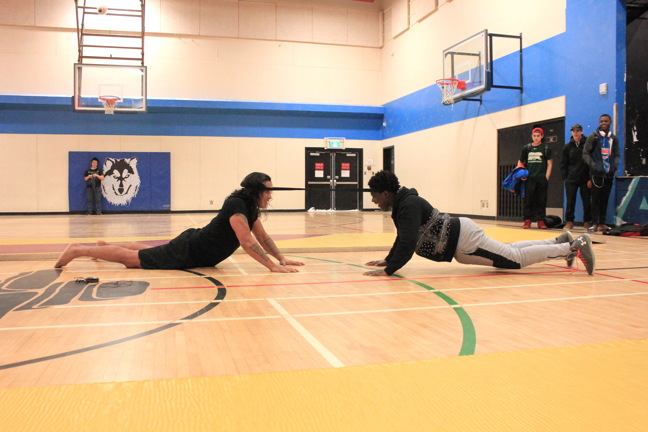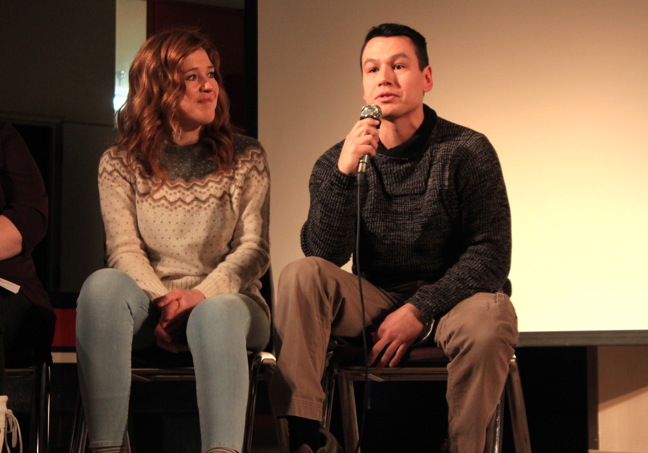Olympian brings star power, mental health money to Nunavut
Bell Let’s Talk tour hits Iqaluit, drops $250,000 for youth peer training

Angel Ootova, left, and Madaline Allakariallak, both 17. Ootova said she has gone through depression in her life and so have some of her family members and friends.

Master of Inuit games, Johnny Issaluk, left, and his reluctant challenger, Christian Thomas, 17, demonstrate the neck pull following the Bell Let’s Talk mental wellness event at Inuksuk High School Jan. 18.

David Lawson, president of the Embrace Life Council, speaks at the Bell Let’s Talk event Jan. 18 at Inuksuk High School in Iqaluit next to Let’s Talk spokesperson and Canadian Olympian Clara Hughes. (PHOTOS BY LISA GREGOIRE)
Angel Ootova, 17, is like many Inuit teenagers: smart, shy and prone to nervous laughter.
She shares other qualities too: she’s suffered from depression and has seen her friends and family members suffer through the same thing.
“I try to support them. I just want them to be alive and see that their life is worth more than anything in the world,” Ootova said.
“At a young age, when you’re starting to develop, all those feelings run through you and you don’t know whether you’re going to be a good role model or if you should let your voice be heard. All those emotions, you don’t know whether to talk about them or keep silent.”
Ootova was one of several hundred students attending a mental wellness event at Inuksuk High School Jan. 18. Picked randomly from the crowd, Ootova nonetheless seemed to embody the theme of the event: Let’s Talk.
“We have some major problems with insecurity, how nobody really likes to talk about it. It should be spread throughout that if you have a problem, don’t be afraid to speak about it,” she said.
Iqaluit was one of six stops planned for the Bell Let’s Talk tour this year which included a visit from six-time Olympic medalist and Let’s Talk spokesperson Clara Hughes and a cheque for $250,000 from Bell and Northwestel to the Embrace Life Council, Nunavut’s suicide prevention body.
The event also included a promise from the Nunavut health minister that a long-term suicide prevention strategy would be tabled soon.
“We’re looking at having that finalized by spring,” Hickes told Nunatsiaq News, after the event.
As health minister, Hickes is the territorial cabinet’s point-person for suicide prevention in Nunavut.
That long-term plan follows from the territory’s one-year, short term plan, “Resiliency Within” which was developed by a territorial partnership consisting of the Nunavut Government, Nunavut RCMP, Nunavut Tunngavik Inc. and the Embrace Life Council.
There’s good reason to include Nunavut on a tour talking about, and de-stigmatizing, mental illness.
Nunavut’s suicide rate is about 10 times the national average. Widespread untreated trauma here fuels a toxic mix of addiction and crime that still outpaces the rest of the country.
In partnership with Northwestel, the Let’s Talk initiative is donating $250,000 to help pay for something called safeTALK in Nunavut—a program that offers a half-day of training to youth over age 15 to become “suicide-alert peer helpers” so they can learn to steer those struggling with pain and trauma toward the local resources they need.
Hickes praised the contribution.
“Anytime we can bring further resources to Nunavut to help us with some of the mental heath challenges at the community level, that’s where the key focus needs to be brought forward,” said Hickes. You can broaden the impact of best practices, he added, by, “engaging more and more leaders within the community, especially among our youthful leaders.”
He might have been talking about Ootova.
“There are other ways to let the feelings out. I like to write about my feelings and sometimes I throw it out or let it be. There are things in the community. There’s always volunteer work,” she told Nunatsiaq News. “You can go hunting, visit friends. You can draw, drawing is really calming.”
The event got her thinking about all this, Ootova said. Hughes is a big inspiration, she added. And others seemed to feel the same.
Hughes drew cheers from the audience when she stepped on stage, aided by crutches in the wake of knee surgery, to deliver advice and encouragement.
Instead of having Hughes make a speech at the microphone, Grade 12 student hosts—Hope Carpenter and Jessica Matthews—took turns asking her questions about the barriers people face in overcoming mental illness.
Hughes said she struggled with depression in her youth and that not only did she abuse drugs and alcohol but smoked a pack of cigarettes a day. It was a way to deal with her father’s alcoholism, among other things, she said.
Sport was a way out of that life, she told her young audience, much like it might be for young Nunavummiut. But after she joined Canada’s Olympic team and started winning medals, it just got worse, she admitted: with everyone was praising her, she had to work even harder to suppress painful feelings inside.
“As much as sports was a great outlet, it was a destructive one as well,” she said.
Hughes, who has travelled throughout Inuit Nunangat, said the Inuit connection to their ancestors and to the land is inspiring. She encouraged the teenagers in the room struggling with depression or other mental illness to reach out to their families and connect to their traditions to find strength and resilience.
“You can start figuring out who you are,” she said. “I was always lost and confused, trying to get rid of the pain.”
After the Embrace Life cheque presentation from Mary Deacon, chair of the Bell Let’s Talk initiative, and Paul Flaherty, president and CEO of Northwestel, students were invited to the gym to watch a traditional games demonstration by veteran athlete Johnny Issaluk and some brave student volunteers.
Before the presentation, Issaluk said that he too suffered from depression as a youth and that most of it came from feelings of shame. He said Inuit games were traditionally, and still are today, a way to stay healthy and vibrant in body and mind.
On Jan. 25, Bell Let’s Talk Day, Bell will donate five cents to Canadian mental health programs for every text message, mobile and long distance call made by Bell Canada customers; every tweet using #BellLetsTalk; and, every Instagram post using #BellLetsTalk.
In 2016, Bell Let’s Talk Day generated 125.9 million messages of support and Bell increased its funding for Canadian mental health programs by more than $6.2 million.





(0) Comments